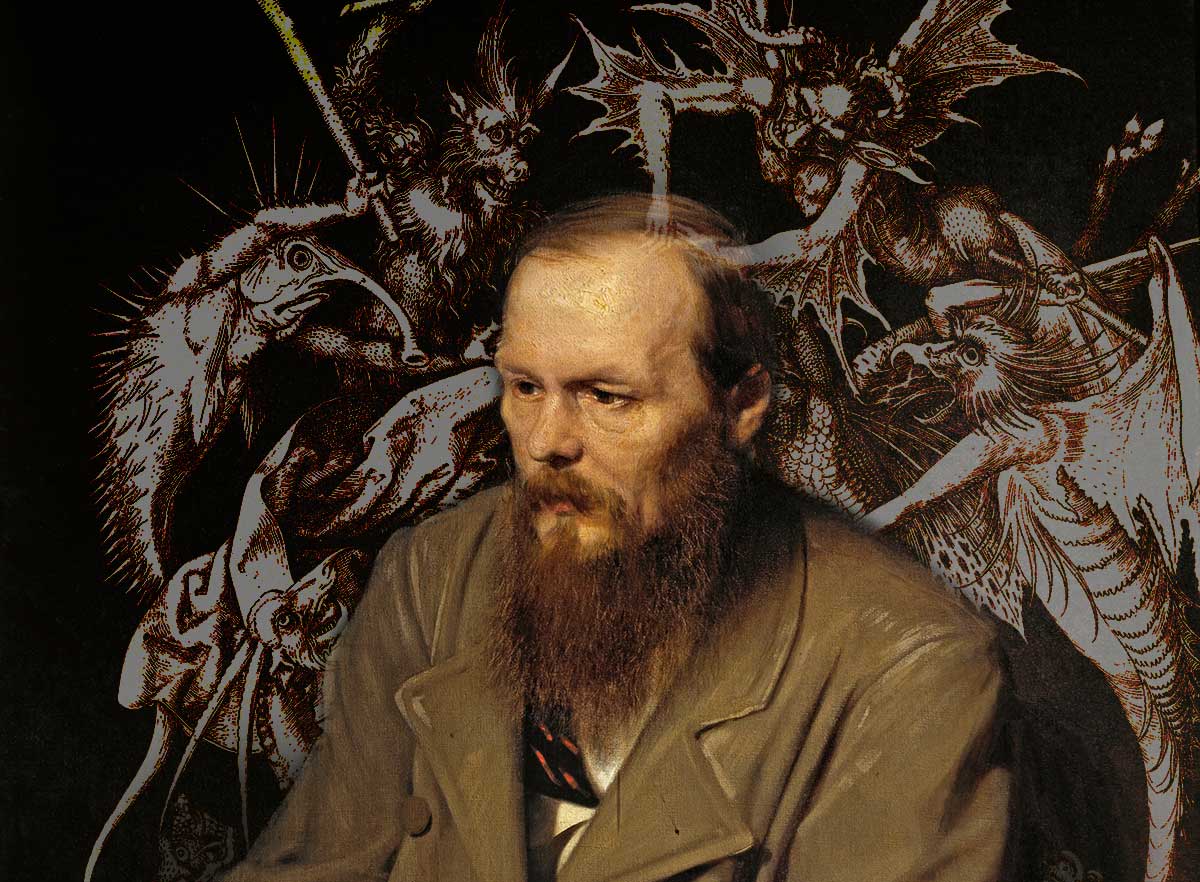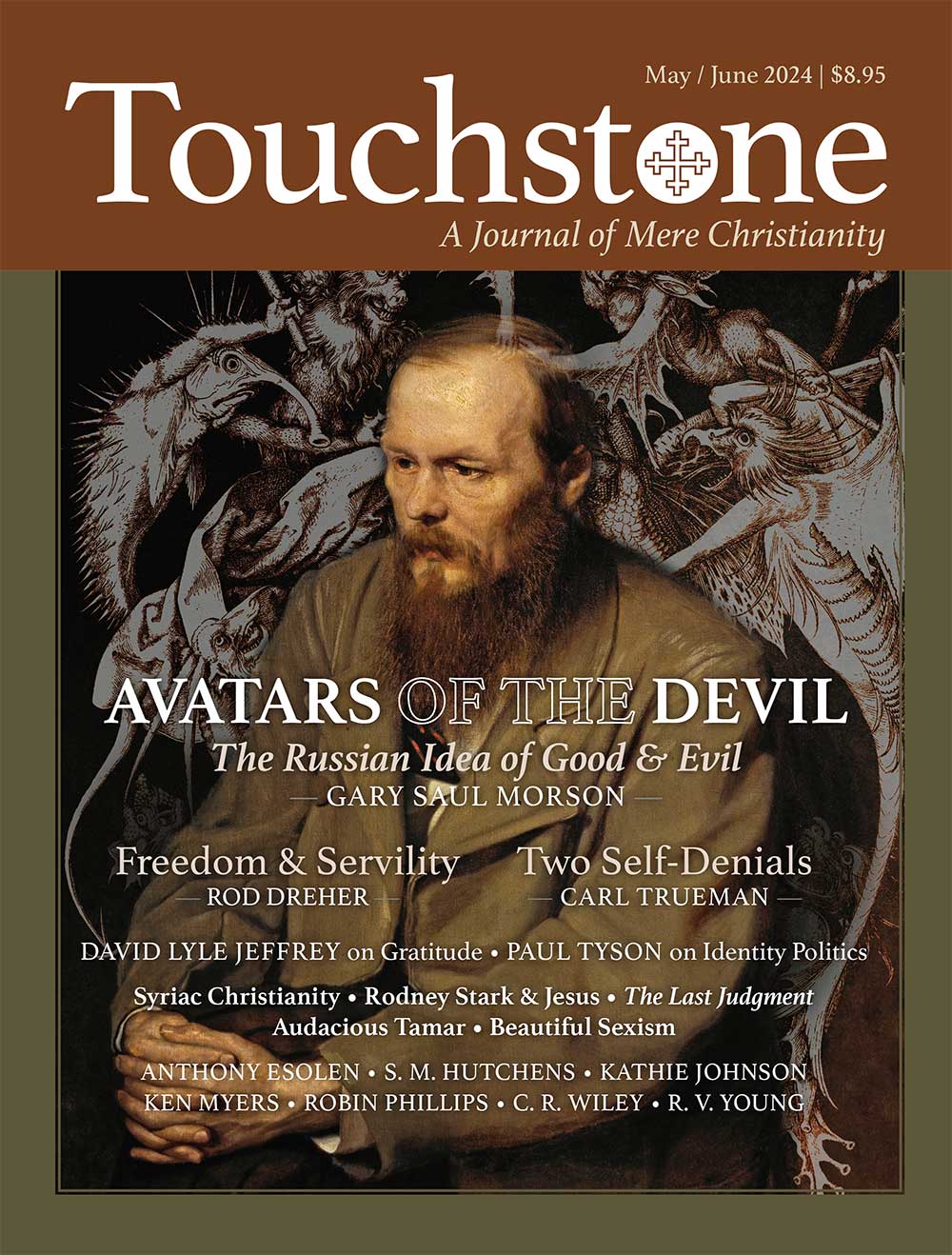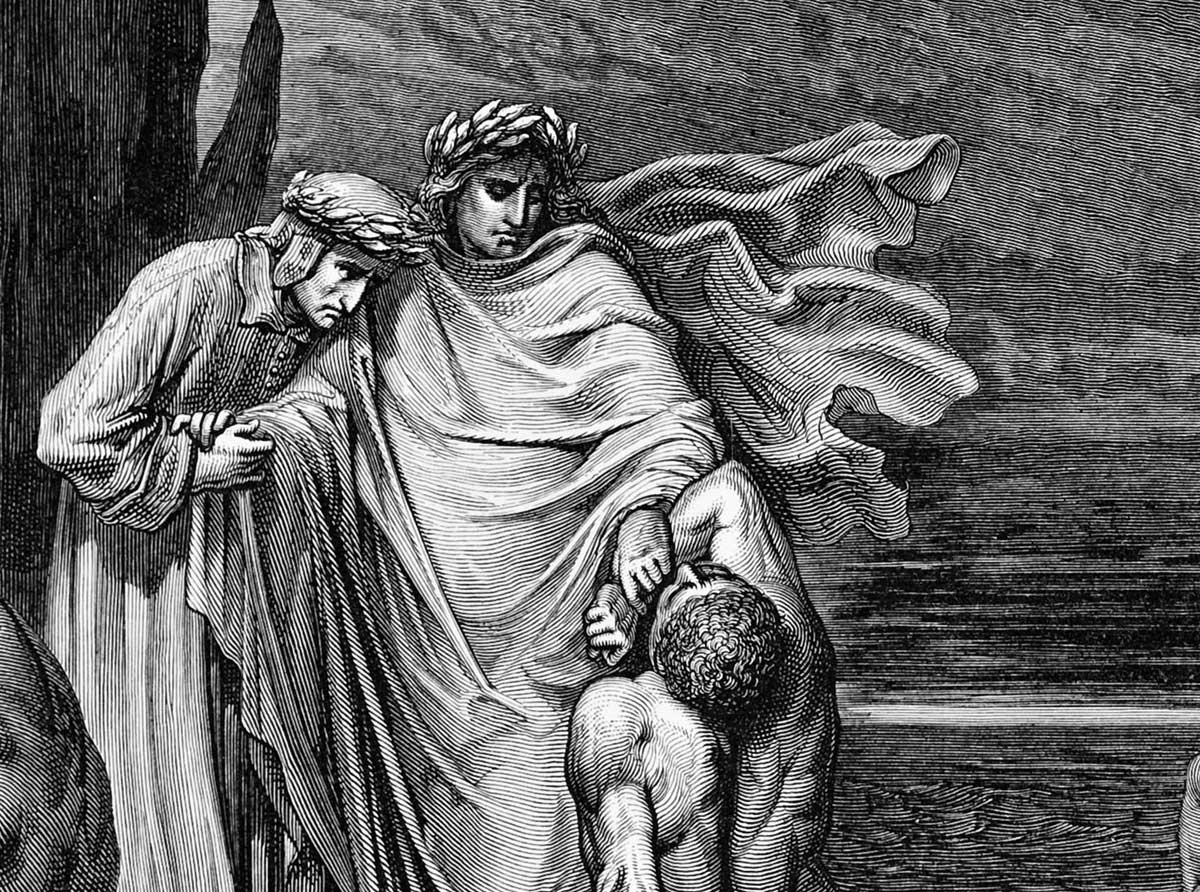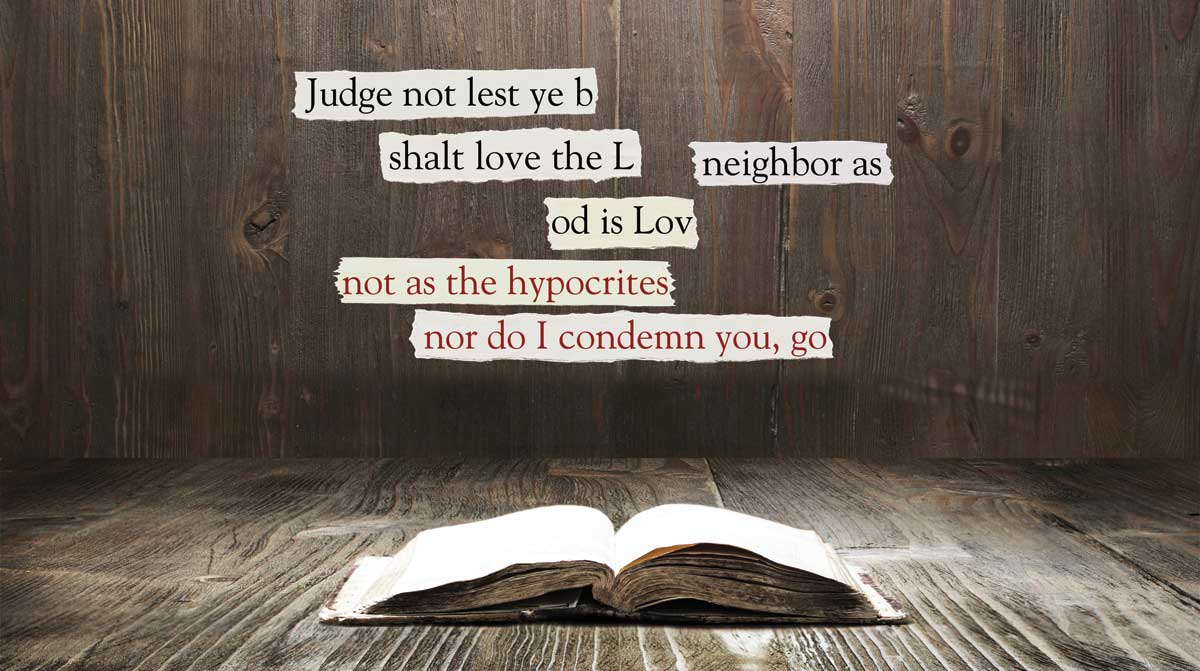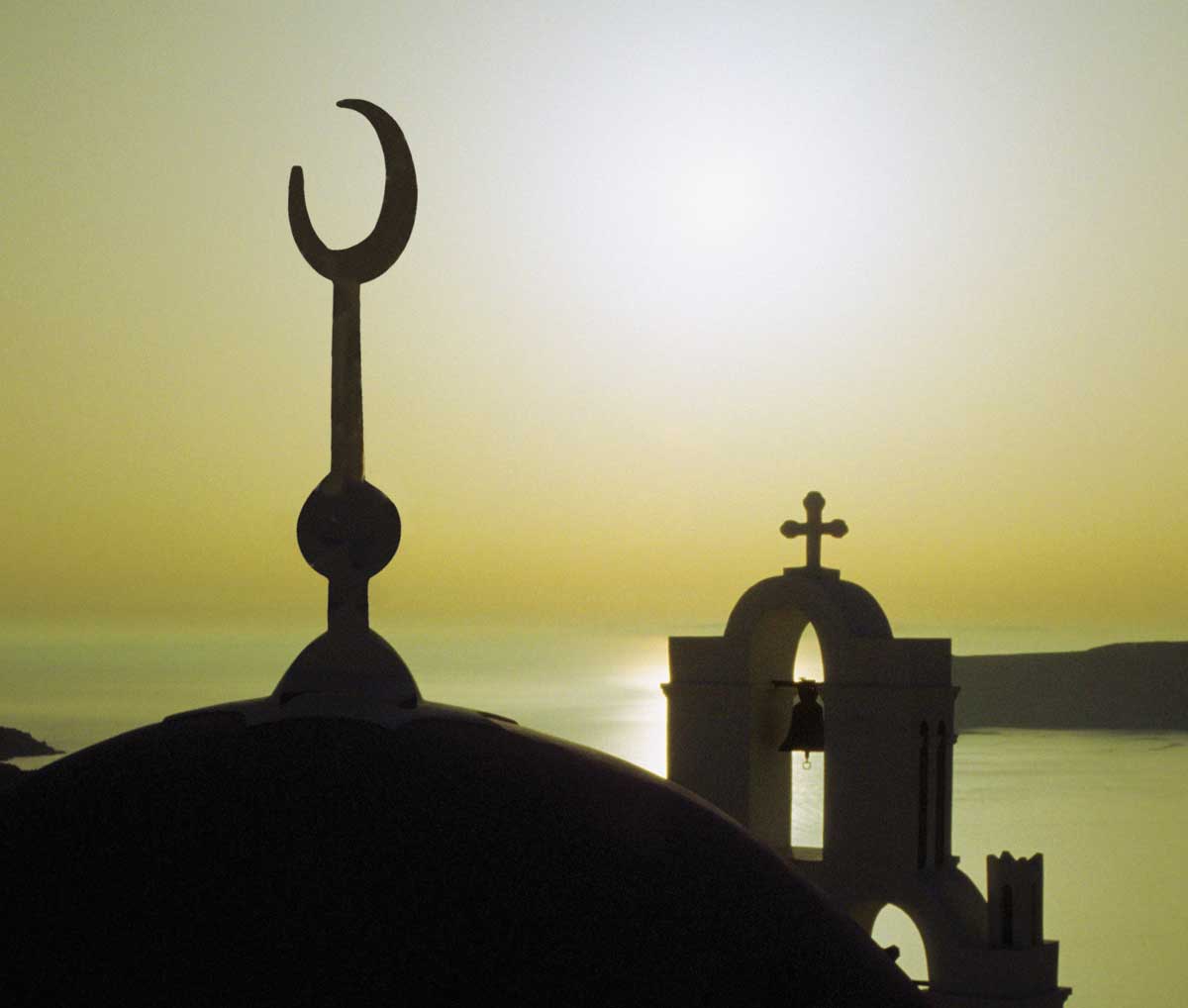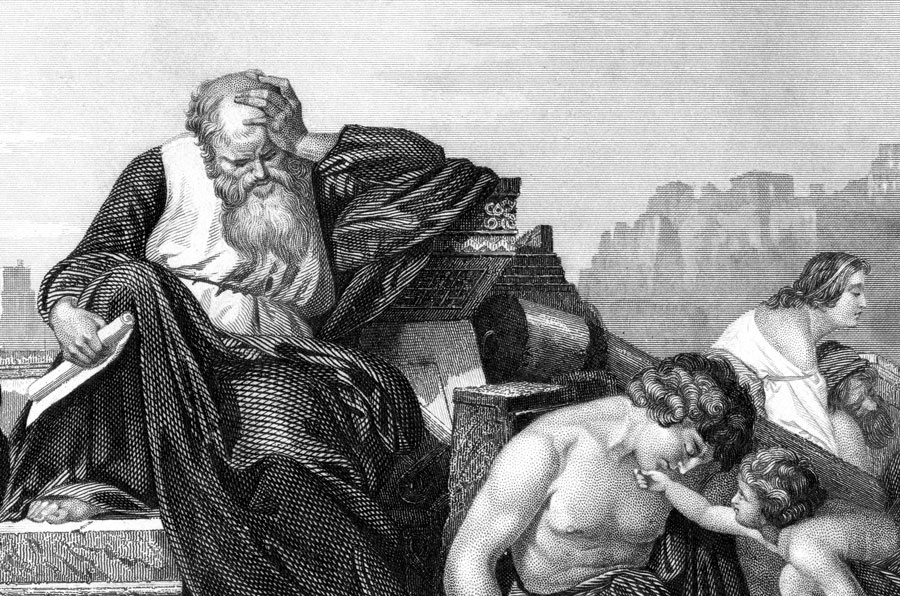Avatars of the Devil
The Russian Idea of Good & Evil
The devil is in the details, and so is the angel.
Russian history exhibits two contrary visions of human life, the dramatic and the prosaic. One led to the cult of revolution, the other to the realist novel. Russia’s greatest writers, from Tolstoy, Dostoevsky, and Chekhov on, appreciated the quotidian and stressed ordinary virtues. To understand good and evil, they taught, one should look within and pay attention to the people always before one’s eyes. The meaning of life is not mysterious but familiar; it is not concealed in the mists of distance but hidden in plain view.
Russian history is nothing if not dramatic. If English history is a story of gradual reform, Russia alternated between sudden, violent upheaval and utter stagnation. As Russians never tired of pointing out, Peter the Great Westernized the country almost overnight. “Peter had no time to waste,” observed “furious” Vissarion Belinsky, Russia’s most influential critic. “He could not sow and wait calmly until the scattered seed would germinate. . . . He understood . . . that sweeping changes . . . that [elsewhere] have been the work of centuries” had to be accomplished suddenly. The only way to do so was to apply unprecedented brute force.
The Bolsheviks out-Petered Peter. The Book of Revelation promises to “make all things new,” and the militantly atheist Bolsheviks believed they could do so on their own, without divine intervention. Engels called it “the leap from the kingdom of necessity to the kingdom of freedom.” No longer would humanity be subject to the relentless laws of nature; those laws would now be reformulated according to human will. Listen to Trotsky: “The present distribution of mountains and rivers, of fields, of meadows, of steppes, of forests, and of seashores, cannot be considered final. . . . . Faith merely promises to move mountains” but “man in Socialist society will command nature in its entirety, with its grouse and sturgeons.”
Bolsheviks were obsessed with the idea that sheer will, directed by the Party, would command forces previously beyond human control. In Bolshevik terms, “spontaneity” would yield to “consciousness.” The “chaos of the market” would be superseded by the planned economy, which, because nothing would just happen, would eliminate waste and therefore be exponentially more productive. The same thinking applied everywhere: “Communist life will not be formed blindly, like coral islands,” Trotsky instructed, “but will be built consciously. Life will cease to be elemental” and even “breathing, the circulation of the blood, digestion, reproduction” will all bend “to the control of human will.” “Ye shall be as gods,” Satan promises Eve, and Trotsky foresaw a race of supermen: “The average human type will rise to the heights of an Aristotle, a Goethe, or a Marx. And above this ridge new peaks will rise.” Stalin concurred: “Our task is not to study economics but to change it,” he proclaimed. “We are bound by no laws. There are no fortresses which Bolsheviks cannot storm.”
This revolution, in short, was unlike all previous ones because it transformed the nature of the universe. Perhaps the most striking formulation of this idea belongs to Yuri Piatakov, whom Lenin called one of the six most promising Communists. When in 1928 his old friend Nikolay Volsky reproached him for having renounced his former Trotskyite views, Piatakov ascribed his conversion to his belief that the Party could literally achieve miracles:
According to Lenin, the Communist Party is based on the principle of coercion which doesn’t recognize any limitations. . . . . And the central idea of this principle of boundless coercion is not coercion itself but the absence of any limitation whatsoever—moral, political, and even physical. . . . . Such a Party is capable of achieving miracles. . . .
A real Communist . . . . that is, a man who was raised in the Party and had absorbed its spirit deeply [would] become . . . . a miracle man.
As novelist Vasily Grossman observed, “the violence of the totalitarian state . . . . becomes an object of mystical worship.”
In Love with Terror
Nadezhda Mandelstam recalled how even intellectuals who should have known better succumbed to the mystique of revolution:
My brother Yevgeny Yakovlevich used to say that the decisive part in the subjugation of the intelligentsia was played not by terror and bribery (though God knows there was enough of both) but by the word “Revolution,” which none of them could bear to give up. It is a word to which whole nations have succumbed, and its force was such that one wonders why our rulers still needed prisons and capital punishment.
The word “terrorism” also carried mystical overtones. Russia was the first country where terrorism became a respected mode of life. If you asked young men or women about an intended career, they might answer “terrorist.” The profession ran in families, passed on, like many others, from generation to generation.
Often enough, social justice was irrelevant: the famous terrorist Vera Zasulich recalled that, growing up, she had never even heard of the horrors of serfdom. No one exemplified this ethos more than Boris Savinkov, who was both director of the Socialist Revolutionary Combat Organization, which staged daring assassinations of prominent people, and a novelist, whose heroes were terrorists. He kept clippings concerning both careers. In his memoirs, Savinkov recalled how the famous terrorist Dora Brilliant “lived by only one thing—her faith in terror [itself]. . . . Questions of program did not interest her.” Some terrorists, Savinkov said, were “in love with terror.”
At first the goal was social justice and revolution the means; then the goal was revolution and terrorism the means; then terrorism itself became an object of “mystical worship.” The sheer thrill of living a liminal life, outside all social norms, beyond good and evil—a life of danger and excitement—appealed to many. To them, peace was bourgeois and ordinary life pure vulgarity. The hero of Savinkov’s novel Pale Horse—the title, of course, comes from Revelation—asks: “What would I be doing if I were not involved in terror? . . . . I don’t know. . . . But I know one thing for certain: I don’t want to live a peaceful life. . . . What’s my life . . . . without the joyful awareness that worldly laws are not for me?”
This terrorism often became addictive, demanding ever stronger doses. When murder itself became routine, more and more extreme exploits had to be devised, a process ending only with death, which Savinkov depicted as a glorious tragedy.
Some enjoyed this thrill vicariously. Poet Alexander Blok, who never threw a bomb, discovered in violence an antidote to “the boredom, the triviality” of ordinary life. Terrorism, he said, will “change our false, boring hideous life.” The goal of revolution matters less than “the roar,” which is “always about something grand—always.” Russian artists, in Blok’s view, must embrace everything opposed to “practical sense, moderation, tidiness” and reject the rule of law, constitutional democracy, and parliamentary procedure as “such a dull and dreadful somnolence, such a thunderous yawn.” Artists should thrill even to the destruction of art itself. “Do not be alarmed when citadels, palaces, pictures, books, are destroyed” because in their place—hear it!—is “the music.” “Which is more frightening, the arson and lynchings in one camp or the oppressive lack of musicality in the other?”
Half a century earlier, Alexander Herzen, the brilliant writer often called “the first Russian socialist,” defended his country against the charge that it was irremediably oppressive by saying that Russia is an all-or-nothing place. “We are too oppressed, too wretched to make do with a mere half-liberty,” he boasted. “There is something truly irrational about our lives, but nothing that is either banal or stagnant or bourgeois. . . .
Not only revolutionaries expressed contempt for the practical and prosaic. The philosopher Nikolai Berdyaev refused “to bear the burden of the commonplace, that which constitutes the very stuff of ‘life.’” He professed a lifelong “deep-rooted disinclination to the habitual” and an inclination to “an irresistible eschatological impulse.” Talk of everyday life—quarrels, marriages, family—“revolted” him, to the point where he could not understand “why people attached such importance to the principle of motherhood,” and he couldn’t endure “the very sight of pregnant women.”
Nadezhda Mandelstam contrasted Berdyaev’s values with those of prosaic poets like her husband, Osip Mandelstam, who “do not look down on ordinary human life—on the contrary, it is a source of beauty for them.” Nadezhda cites Osip’s well-known pronouncement that “the earth is not an encumbrance or an unfortunate accident, but a God-given place.”
Where God Is
Precisely because apocalyptic thinking predominated in Russian history, the major writers rejected it. They devoted the greatest fiction in world literature to the opposite view: you understand good and evil best when you focus on the countless small choices of everyday life. Elijah discovered that God is not in the earthquake, not in the fire, but speaks in a “still, small voice” (1 Kings 19:11–13). God is in the details, or as Pierre, the hero of War and Peace, remembers his nurse saying, “God is here and everywhere.”
War and Peace recounts how, step by surprising step, Pierre at last recognizes the blessedness of ordinary life right before his eyes. That life is valuable in itself, not as a mere steppingstone to some grand historical aim, as Pierre previously supposed. When he at last attains wisdom, Pierre no longer needs such an aim
because he now had faith—not faith in any sort of rule, or words, or ideas, but faith in a living, perpetually manifest God; formerly he had sought him in aims he had set himself . . . . and suddenly, in his captivity [by the French], he had learned, not by words or reasoning, but by direct feeling . . . . that God is here and everywhere. . . .
The novel’s most important passage follows:
He felt like a man who, after straining his eyes to peer into the remote distance, finds what he was seeking at his very feet. . . . . He had equipped himself with a mental telescope and gazed into the distance. . . . Now, however, he had learned to see the great, the eternal, the infinite in everything, and therefore . . . . he naturally discarded the telescope through which he had . . . . been gazing over the heads of men, and joyfully surveyed the ever-changing, eternally great, unfathomable, and infinite life around him. . . . . The awful question: What for? which had shattered all his intellectual edifices in the past, no longer existed for him. To that question . . . . a simple answer was now always ready in his soul: Because there is a God, that God without whose will not one hair of a man’s head falls.
In Anna Karenina Levin arrives at much the same conclusion. The divine dwells in the everyday. The most important miracle is overlooked because it is constantly present. Levin at last realizes: “And I watched for miracles, complained that I did not see a miracle that would convince me. A material miracle would have persuaded me. And here is a miracle . . . . surrounding me on all sides, and I never noticed it.”
Levin recalls how his sister-in-law Dolly caught her children in a prank. Left to themselves, they “had begun cooking raspberries over the candles and pouring jets of milk into each other’s mouths. Their mother . . . . began impressing upon them . . . . that if they smashed the cups, they would have nothing to drink their tea out of, and that if they wasted the milk, they would have nothing to eat, and die of hunger.” The children, however, “could not believe it, for they could not take in the immensity of all they habitually enjoyed, and so they could not conceive that they were destroying the very thing they lived by.”
Levin reflects that in destroying faith, adults resemble those children. “Well, then, leave us with our passions and thoughts, without any ideas of what is right, without any explanation of moral evil” and we wouldn’t be able to do anything. “We destroy them only because we’re spiritually satisfied. Exactly like the children!” People fail to value what is most important because it is so familiar.
In one of his late essays, Tolstoy explained his core idea by an analogy:
[The painter] Bryullov one day corrected a pupil’s sketch. The pupil . . . . exclaimed: “Why, you only touched it a tiny bit, but it is quite a different thing.” Bryullov replied: “Art begins where that ‘tiny bit’ begins.”
That saying is strikingly true not only of art but of all life . . . . true life begins where the ‘tiny bit’ begins—where what seem to us minute and infinitely small alterations take place. True life is not lived where great external changes take place—where people move about, clash, fight, and slay one another—it is lived only where these tiny, tiny infinitesimally small changes occur. . . . .
Tiny, tiny alterations—but on them depend the most immense and terrible consequences.
What Hell Is Like
However dramatic the outcome, evil is a matter of countless “tiny alterations.” And so when Svidrigailov, the villain of Crime and Punishment, imagines hell, it does not at all resemble the hell of Milton and Dante, but is insufferably small, close, and smelly. If evil is prosaic, what else could hell be? “And what if there are only spiders there?” Svidrigailov muses. “We always imagine eternity as something beyond our conception, something vast, vast! But why must it be vast? Instead of all that, what if it’s one little room, like an outhouse in the country, black and grimy and spiders in every corner, and that’s all eternity is?”
In Karamazov, it is Satan who is insufferably petty, and Dostoevsky plays the incongruity between this petty demon and the usual image of the devil for all the humor it is worth. The devil who visits Ivan in a nightmare displays “gentility on straightened means.” He has apparently once participated in the very highest society but has lost his social connections—an allusion to the devil’s rebellion and fall. Far from terrible, Ivan’s devil is “good-natured . . . . accommodating, and ready to assume any amiable expression as the occasion might arise.” He is, in short, an ordinary fellow, resembling people we like spending time with. In fact, he is just like us. Evil, it seems, is not something grand and alien, but ordinary and familiar, or why would there be so much of it?
Stop expecting something sublime from me, the devil tells Ivan:
I repeat, moderate your expectations. . . . . You are really angry with me for not having appeared to you in a red glow, with thunder and lightning, with scorched wings, but have shown myself in such a modest form. You are wounded, first of all, in your aesthetic feelings, and, secondly, in your pride. How could such a vulgar devil visit such a great man as you!
Not only does the devil resemble us, but so does the other world he inhabits, which keeps changing with human theories about it. It has even adopted the metric system! “Once everything used to be . . . . five senses, four elements, and then everything hung together somehow . . . . but since we’ve learned that you’ve discovered the chemical molecule and protoplasm and the devil knows what, we had to lower our crest.” Otherworldly religious beliefs keep up with the times, too. Amazingly enough, the devil turns out to be an agnostic!
Cana of Galilee
Radicals of Dostoevsky’s time despised what they called “small deeds,” such as one person charitably helping another, because, they maintained, only total social transformation could overcome evil. Anything less was counterproductive because it delayed the extreme misery igniting revolution—or, as Lenin famously said, “the worse, the better.” Dostoevsky deplored this way of looking at things and recommended what he called “microscopic actions.”
In The Idiot, Ippolit rejects the fashionable view that “individual benevolence was of no use.” On the contrary, “anyone who attacks individual charity . . . . attacks human nature and casts contempt on personal dignity . . . .the living impulse of one personality to exert a direct influence upon another.” He recounts the story of an old general who greeted prisoners being marched off to Siberia and asked each about his needs. “He talked to them as though they were brothers, and they came to look upon him as a father.” Even hardened criminals recalled the old general tenderly. As Ippolit explains, the general “dropped a seed,” something small that may become something much bigger:
How can you tell what seed may have been dropped in his [the prisoner’s] soul forever by that old general, whom he hasn’t forgotten for twenty years? How can you tell . . . . what significance such an association of one personality with another may have on the destinies of those engaged? . . . . You know, it’s a matter of a whole lifetime, an infinite multitude of ramifications hidden from us. . . . . In scattering the seed . . . . your kind deeds, you are giving away . . . . a part of your personality, and taking into yourself part of another . . . and you will be rewarded with knowledge of the most unexpected discoveries. . . .
And how can you tell what part you may have in the future determination of the destinies of humanity?
The hero of The Brothers Karamazov, Alyosha, resembles the impatient radicals of his generation, only he places his faith in God rather than atheist revolution. Like them, he is an idealist “seeking for immediate action” and longing for great change by “swift achievement.” What revolution is for them, miracles are for him. When his beloved mentor, Father Zossima, dies, Alyosha anticipates the miracle traditionally indicating a saint: the body will not rot but emit a sweet smell. Alyosha’s faith is shaken when the very opposite happens, and the body rots even faster than usual.
The giddy Madame Hokhlakova exclaims: “I never would have expected such behavior from him,” as if the corpse were choosing how to rot. And yet, that is what Zossima would have chosen, to teach Alyosha to value not the dramatic, but the ordinary.
Father Zossima’s theology differs from that of other monks. Father Ferapont, an extreme ascetic, imagines he converses with the Holy Spirit, but in this novel the Holy Spirit represents not asceticism but joyous celebration of life and love of the world God made.
When Zossima was a boy, his atheist older brother fell ill with consumption and found himself believing, not just in God, but in life. He comforted his grieving mother: “Don’t cry mother. . . . Life is paradise, and we are all in paradise, but we don’t see it.” Recalling the joy his brother took in God’s world, Zossima confides: “I bless the rising sun each day, and, as before, my heart sings to meet it, but now [that I am near death] I love even more its setting, its long slanting rays and the soft tender gentle memories that come with them . . . . and over all the Divine Truth, softening, reconciling, forgiving.”
As a young monk, Zossima met a youth who also appreciated “the beauty of this world of God’s and of the great mystery of it.” Zossima tells the monks: “Love all God’s creation, the whole and every grain of sand in it. Love every leaf, every ray of God’s light. Love the animals, love the plants, love everything . . . . [and] you will perceive the divine mystery in things.”
Atheists place their faith in dramatic deeds, but it is folly to imagine that those who would create perfection by violence will ever cease to use it. No, the world is made better not by “swift achievement,” as Alyosha also imagines, but by the smallest acts of goodness constantly performed. Zossima bids the monks not to scowl as they walk along because this small act can plant “an evil seed” in someone’s heart. “Every day and every hour, every minute” we can choose instead to look kindly and charitably at others. As Ippolit concludes in The Idiot, kind (or unkind) acts can beget ever more in an endless chain of “infinite ramifications,” or, in Zossima’s words, it all resembles an ocean. This is where the Holy Ghost shows himself.
When Alyosha’s faith is shaken, he accepts an invitation to visit the sinful Grushenka—that is, to fall. He arrives just when she, too, is undergoing a spiritual crisis, and the two sufferers help each other—not by doing anything, but by listening with care. Grushenka then recounts a folktale about how a small deed can make all the difference.
It seems a wicked old lady died and was cast into the burning lake. Pitying her, her guardian angel recalled that she had done one good deed—she had given an onion to a beggar—and the angel rushes to tell God. God replies, you take that onion and pull her out of hell with it. And so the angel holds out the onion and the lady grabs onto it. So that the stem doesn’t break, the angel lifts her very slowly. Other sinners grab onto the wicked woman’s legs, so they, too, can escape.
The wicked lady has a choice: she can identify with her one charitable moment and let the other sinners hang on, or she can choose to repeat the overriding pattern of her life and kick them away. She chooses the latter: “I’m to be pulled out, not you. It’s my onion, not yours,” she scowls, and at that moment the stem breaks, and the woman has been roasting in hell ever since. In comforting each other, Grushenka explains, she and Alyosha have given each other an onion, and something as small as that really matters if one only recognizes it.
Alyosha returns to the monastery where the good Father Paissy is reading the Gospel over Zossima’s body. The Gospel story Alyosha hears as he slips into a reverie is the story of the marriage at Cana. Pause to consider how odd it is for Dostoevsky to place this story, and this miracle, at the book’s thematic center. It could not differ more from the Lazarus story he made the thematic center of Crime and Punishment. It occurs in only one of the four Gospels; it has nothing to do with Jesus’ sacrificial mission (“mine hour has not yet come,” he tells Mary); and no one, including the governor of the feast, knows of it.
“Ah, that sweet miracle,” Alyosha enthuses. “It was not men’s grief but their joy Christ visited,” and he remembers how Zossima told him that “he who loves men loves them in their gladness, too.” When Mary tells Jesus to make wine from water, Alyosha thinks: she “knew that he had come not only to make his great terrible sacrifice. She knew that his heart was open even to the simple, artless merry-making of some obscure and unlearned people. . . . And indeed,” Alyosha asks, “was it to make wine abundant at poor weddings that he had come down to earth?” In a sense, it was: like the folktale of the onion, the lesson of this story is that life is lived primarily at ordinary moments. Always and everywhere, God—the Holy Ghost—abides among us.
The marriage at Cana is never over. Alyosha dreams that he, too, is summoned to the feast, where he finds Father Zossima. “Why do you wonder at me?” Zossima asks. “I gave an onion to a beggar, so I, too, am here. And many here have given only an onion—one little onion. . . . And you too . . . . have known how to give a famished woman an onion today.” Alyosha is afraid to look at Jesus, but Zossima tells him: yes, he is infinitely sublime, but he has also “made himself like unto us from love and rejoices with us.”
History
One might have supposed that the extremity of Soviet evil would have convinced people that what matters most is what shocks the most, but the greatest writers drew the opposite conclusion. Precisely because Bolshevik crimes were justified in terms of grand upheavals and abstractions, the writers appreciated the importance of ordinary decency and unheroic individuals. From the official perspective, only social classes, not specific people, counted. Stalin is supposed to have remarked that one death is a tragedy but a million is a statistic. The greatest literary works enabled readers to appreciate that a million deaths means a million tragedies.
When Klara, in Solzhenitsyn’s novel In the First Circle, wonders at the countless innocent people dying in the Party’s effort to build Communism, Ernst replies “gently but firmly . . . . ‘Who is doing these things? . . . It is History. . . . You and I sometimes find it horrible, Klara, but it’s time we were used to the fact that . . . . what matters is the conviction that the process is necessary and inevitable.’” For ideologists, there is no (small h) history—events happening to real people—only History, an abstraction that somehow has an agency of its own. By contrast, the hero of Grossman’s novel Forever Flowing maintains that (big H) History is a mere abstraction that “has been dreamt up by men. There is no [such] history—it is like grinding water.”
Conscience & Kindness
Nadezhda Mandelstam recalled that under the Soviets the word “conscience” was replaced by “consciousness” (as in “revolutionary consciousness”). “Kindness” was considered old-fashioned, and its proponents were apparently as extinct as mammoths. One can therefore appreciate how startling it was for unofficial writers to narrate the awakening of conscience and to insist that kindness was the essence of humanness.
Imprisoned in a Nazi camp, the saintly Ikonnikov in Grossman’s Life and Fate rejects the ideological thinking of his Bolshevik fellow prisoners and, as they see it, “professed a belief in an absurd theory of morality that—in his own words—transcended class.” Bolshevik murders were done in the name of an abstract Good, Ikonnikov explains, and so “I don’t believe in your ‘Good.’ I believe in human kindness.” Instead of abstract Good, there is “the kindness of an old lady carrying a piece of bread to a prisoner.”
The Bolshevik Krymov explains: “There is no place for Christian humanitarianism now. Our Soviet system is something sterner.” The Bolsheviks, in fact, did everything possible to uproot compassion, decency, kindness, and other “extra-class” virtues, which were regarded as bourgeois mystifications. And so Grossman repeatedly asks: Is there a core decency, basic prosaic kindness, that cannot be totally eradicated? “The fate of both man and the totalitarian state depends on the answer.”
Most Russian intellectuals, observes Grossman’s character Madyarov, have “mercilessly sacrificed the individual to some abstract idea of humanity.” Chekhov is the only one who never yielded, even briefly, to such thinking.
Chekhov said: let’s put . . . . all these progressive ideas . . . . to one side. . . . . let’s be kind and attentive to the individual man—whether he’s a bishop, a peasant, an industrial magnate, a convict in the Sakhalin Islands or a waiter in a restaurant. Let’s begin with respect, compassion, and love for the individual.
The Russians have seen everything over the last thousand years—grandeur and super-grandeur; but what they have never seen is democracy. . . . The [Soviet] State . . . . simply does not understand Chekhov—that’s why it tolerates him.
When Krymov begins to doubt Communism, he considers the simple old women who adopted children of arrested parents when intellectuals and Party members deemed it too dangerous to do so. He asks himself: “Were these old women more brave and more honorable than Old Bolsheviks?”
Ikonnikov relates the novel’s key incident. Surly and brutal German soldiers command an old Russian woman to care for a German soldier who has accidentally shot himself. Left alone with him, she hears him beg for water and reflects that what she should do is strangle him. And yet, for some reason she cannot explain even to herself, she helps him. This story, like Krymov’s reflections on taking in abandoned children, unmistakably alludes to the story of the Good Samaritan. Ikonnikov reflects on
[t]his senseless kindness. . . . A mad, blind kindness. . . . . This . . . . stupid kindness, is what is most truly human in a human being. It is . . . . the highest achievement of his soul. . . . . This kindness is both senseless and wordless. . . . . But the more I saw the darkness of fascism, the more clearly I realized that human qualities persist . . . . even at the door of the gas chamber. . . .
My faith has been tempered in Hell. . . . . The powerlessness of kindness, of senseless kindness, is the secret of its immortality. It can never be conquered. The more stupid, the more senseless, the more hopeless it may seem, the vaster it is. . . . . This dumb, blind love is man’s meaning.
Finding Faith
Atheism was the central tenet of Bolshevik ethics, and so it is remarkable that the four greatest authors of the Soviet period called for faith: the Jewish Grossman and the Christians Pasternak, Bulgakov, and Solzhenitsyn.
These writers affirmed the value of decency outside the bounds of ideology. They insisted on the importance of individual conscience, which must never be entrusted to ideologically minded guardians. In Doctor Zhivago Lara discovers “the root cause of all the evil” everywhere she looks in “the loss of confidence in the value of one’s own opinion. People imagined that it was out of date to follow their own moral sense, that they must all sing in chorus and live by other people’s notions, notions that were being crammed down everybody’s throat.” In Bulgakov’s The Master and Margarita, the devil’s assistant, the “choirmaster” Korovyov, literally makes people unable to stop singing in unison. Jesus, who appears as a character, performs no miracles but embodies perfect kindness to all.
In The Gulag Archipelago, Solzhenitsyn narrates how he found faith. Encountering a Jewish believer in God, Solzhenitsyn was ready to voice prescribed objections when he suddenly realized that they were not what he really thought, only what had been “planted from outside.” Experience at last teaches him that good and evil are real, not just class-based myths, and that nothing matters more than one’s conscience. Bolshevism teaches that the ends always justify the means because only the result matters. Hard labor taught Solzhenitsyn that “it is not the result—but the spirit!” At some point, he explains, every Gulag prisoner must choose whether or not to “survive at any price,” including harming others. If you make one choice, you may lose your life; make the other, and you lose your conscience.
If you choose to honor conscience, the world changes in unexpected ways. “Your soul, which formerly was dry, now ripens from suffering.” You learn what genuine friendship is. By looking within, you learn “how a human being becomes evil, and how good.”
“In my most evil moments,” he reflects,
I was convinced that I was doing good, and I was well supplied with systematic arguments. And it was only when I lay there on rotting prison straw that I sensed within myself the first stirrings of good. Gradually it was disclosed to me that the line separating good and evil passes not through states, nor between classes, nor between political parties either—but right through every human heart.
Solzhenitsyn learned the essential truth of all religions: “they struggle with the evil inside a human being (inside every human being).” He also learns the falsehood of all revolutions, which find evil only in others, whom they proceed to eliminate. “And then they take to themselves as their heritage the actual evil itself, magnified still more.”
It is impossible to know for sure, on each occasion, where good lies. But if we allow the Spirit to speak within us, we will not miss the chance to give an onion to a beggar.
Gary Saul Morson is Lawrence B. Dumas Professor of the Arts and Humanities and Professor of Slavic Languages and Literatures at Northwestern University.
subscription options
Order
Print/Online Subscription

Get six issues (one year) of Touchstone PLUS full online access including pdf downloads for only $39.95. That's only $3.34 per month!
Order
Online Only
Subscription

Get a one-year full-access subscription to the Touchstone online archives for only $19.95. That's only $1.66 per month!
bulk subscriptions
Order Touchstone subscriptions in bulk and save $10 per sub! Each subscription includes 6 issues of Touchstone plus full online access to touchstonemag.com—including archives, videos, and pdf downloads of recent issues for only $29.95 each! Great for churches or study groups.
Transactions will be processed on a secure server.
more on literature from the online archives
more from the online archives
calling all readers
Please Donate
"There are magazines worth reading but few worth saving . . . Touchstone is just such a magazine."
—Alice von Hildebrand
"Here we do not concede one square millimeter of territory to falsehood, folly, contemporary sentimentality, or fashion. We speak the truth, and let God be our judge. . . . Touchstone is the one committedly Christian conservative journal."
—Anthony Esolen, Touchstone senior editor





